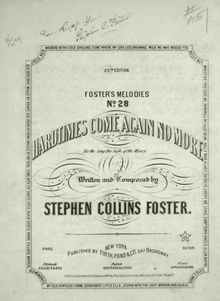
Back Hard Times Come Again No More English すべては終わりぬ Japanese Hard Times Come Again No More Turkish 艰难时刻不再来临 Chinese

"Hard Times Come Again No More" (de còps "Hard Times") ("Los maltempses tòrnan pas pus"), es una cançon de salon americana escricha per Stephen Foster. Foguèt publicada a Nòva York per Firth, Pond & Co. en 1854 jol nom de Foster's Melodies No. 28. Coneguda e populara a l'epòca[1], en America e en Euròpa[2][3], la cançon demanda als astrucs de considerar lo sòrt dels mens fortunats e se termina per un dels imatges preferits de Foster: "una domaisèla palla tombanta."
Le primièr enregistrament audio foguèt un cilindre de cera per l'Edison Manufacturing Company (Edison Gold Moulded 9120) en 1905. Foguèt enregistrat e jogat de nombroses còps despuèi. Lo cançon es referenciada #2659 al Roud Folk Song Index.
Una version satirica subre lo minjar dels soldats èra populara dins la Guèrra Civila Americana, "Hard Tack Come Again No More."
- ↑ R.J. "The Fields of June". Southern Literary Messenger Vol. XXI No.8 (August 1855) Richmond, Va., p. 503: "Among these may be mentioned that sad plaintive beautiful melody of Foster's—'Hard times come again no more.' Have you heard it? What an echo of sadness in it! - :'Tis the song the sigh of the weary— - :Hard time! hard times! - :Many days you have lingered - :Around my cabin door, - :But hard times come again no more!"
- ↑ Sandford, Henry, Mrs. The Girls' Reading-Book. London: W. & R. Chambers (1876), p. 201: "It was in a sewing-school in Lancashire, during the latter part of the Cotton Famine, that the well-known song 'Hard times, hard time, come again no more!' first became familiar to my ears."
- ↑ Hubbard, W.L. (ed.). History of American Music. New York: Irving Squire (1908), p. 80: "Other songs beside those designated as plantation melodies, but all more or less impregnated with sentiment, now came rapidly from his pen and obtained a wide popularity not only in America but in Europe as well. Such songs as ..."Hard Times Come Again No More,"... have become familiar to many nationalities."